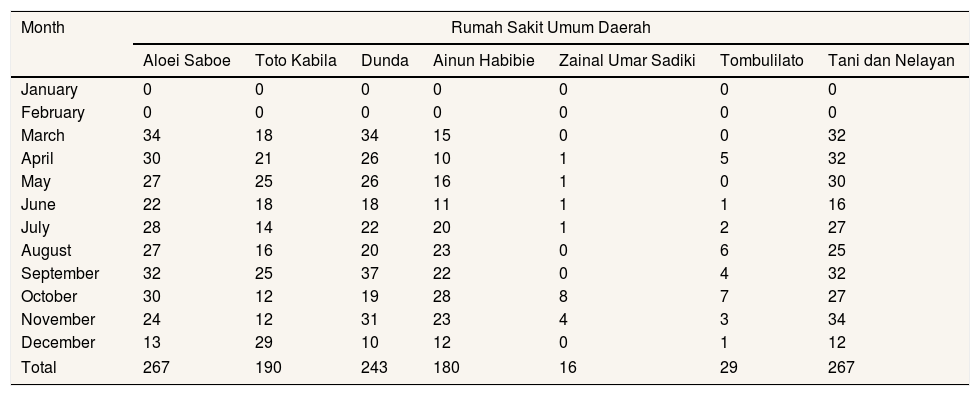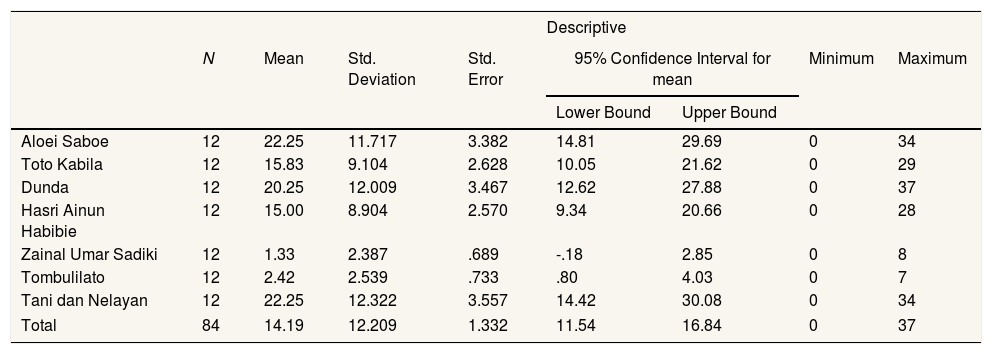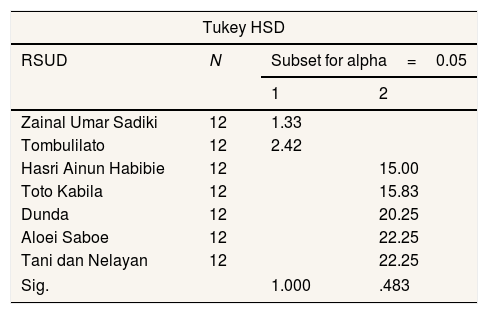
The 1st International Conference on Safety and Public Health
More infoHealth services can cause different perceptions of each patient as recipients of health services. This study aims to determine the difference in the number of complaints in several regional general hospitals in Gorontalo Province.
MethodThe method used in this research is interviewing and collecting data in situ at the Gorontalo provincial health office. Data analysis used a one-way analysis of variance. The research sample consisted of seven regional public hospitals in Gorontalo Province.
ResultsThe results showed that the average number of complaints was 15–22 complaints per month in seven hospitals in Gorontalo Province. The average number of health services complaints in several Gorontalo Provincial Hospitals is at the Aloe Saboe Regional General Hospital, 22 complaints per month.
ConclusionsThe results showed significant differences in the number of complaints about health services at seven regional general hospitals in Gorontalo Province.
Health care service is the right of every person who has guaranteed various regulations or laws and regulations, determined according to health services’ objectives in each country. The existing health service regulations aimed at realizing quality health services to improve the health status of a country.1
The Government has also established the national health insurance since January 1, 2004. The regulation in Law Number 40 of 2004 concerning the National Social Security System. The national social security system is a social security system established in Indonesia as a form of social protection implemented in Indonesia to ensure the fulfillment of every citizen's decent living needs, including being able to obtain health services fairly and thoroughly. Carried out The National Social Security System administration through JKN, organized based on social and equity insurance.2
To accelerate the implementation of Law Number 40 of 2004 concerning the National Social Security System, the Government is making efforts to expedite the National Social Security System Law's performance by enacting Law Number 24 of 2011 concerning Social Security Administration Bodies. The Government then improved the implementation of other social welfare laws and regulations, which were deemed less than optimal. In 2014, through budgeting, the National Social Security System in the health sector became one of the main strategic issues in improving the welfare and health of the Indonesian people.3
As part of the Republic of Indonesia, Gorontalo Province is obliged to provide optimal health services based on the regulations of the Government of the Republic of Indonesia through stipulated national health insurance. National health insurance aims to provide health protection for each participant to benefit from meeting primary health needs. Can obtain national health insurance at all hospitals in Indonesia, both public and private hospitals. As a province in Indonesia, Gorontalo is obliged to apply national health insurance to all hospitals, including regional public hospitals, which are government hospitals.
Although the Government has made many efforts through national health insurance to improve the community's health services, there are still many dissatisfactions experienced by patients in obtaining health services. Patients often feel that they are not getting full health services, resulting in blows with the health services provided by doctors and other medical personnel. Patients and their families’ complaints are proven when they feel that they have received health services that are not in accord with under needs as health service users.
The case of health services in Gorontalo Province continues to experience a significant increase. They were evidenced by the number of complaints reported from 2017 to 2019, where there were 2259–2623 health service complaints reported annually. The number of complaints found proves that patients and their families still feel many health problems obtaining health services in Gorontalo Province. Founded health services reported by patients and their families in several regional public hospitals located in Gorontalo Province. The Patient's complaints need to be analyzed to find the average number of complaints and the difference in the number of complaints at each regional general hospital in Gorontalo Province.
MethodThis research is a non-experimental study using a descriptive-analytic approach. This research is qualitative, namely, research that produces descriptive-analytical data obtained through informants either in writing orally —also based on facts obtained through direct observation related to the research topic. This research used qualitative methods that aim to reveal the truth and to understand this truth.4
The study population was all hospitals in Gorontalo Province, while the study sample was regional general hospitals. The research sample was determined using the purposive sampling method, namely the sampling technique based on criteria predetermined by the researcher.5 The samples taken were seven regional general hospitals in Gorontalo Province and were considered representative and met the sample requirements set. The local public hospitals sampled in this study were Aloei Saboei, Toto Kabila, Dunda, Hasri Ainun Habibie, Zainal Umar Sadiki, Tombulilato, and Tani and Nelayan.
The research data collection was carried out directly using observation and interview methods. The data collected is in the form of data on the number of health service complaints found in the seven regional public hospitals used as research samples. Data was collected every month from January 2018 to December 2018. Data analyzed using the one-factor ANOVA test aims to determine the average number of health services complaints at each hospital. That sampled and compared the average value of the number of health service complaints found in seven regional general hospitals in Gorontalo Province.
ResultsThe number of health service complaints based on the results of data collection carried out for twelve months in 2018 is shown in Table 1. Number of Health Service Complaints at Gorontalo Provincial Hospital. The data was analyzed using descriptive analysis to determine the average number of health service complaints at each hospital (Table 2).
Number of health service complaints at Gorontalo Provincial hospital.
| Month | Rumah Sakit Umum Daerah | ||||||
|---|---|---|---|---|---|---|---|
| Aloei Saboe | Toto Kabila | Dunda | Ainun Habibie | Zainal Umar Sadiki | Tombulilato | Tani dan Nelayan | |
| January | 0 | 0 | 0 | 0 | 0 | 0 | 0 |
| February | 0 | 0 | 0 | 0 | 0 | 0 | 0 |
| March | 34 | 18 | 34 | 15 | 0 | 0 | 32 |
| April | 30 | 21 | 26 | 10 | 1 | 5 | 32 |
| May | 27 | 25 | 26 | 16 | 1 | 0 | 30 |
| June | 22 | 18 | 18 | 11 | 1 | 1 | 16 |
| July | 28 | 14 | 22 | 20 | 1 | 2 | 27 |
| August | 27 | 16 | 20 | 23 | 0 | 6 | 25 |
| September | 32 | 25 | 37 | 22 | 0 | 4 | 32 |
| October | 30 | 12 | 19 | 28 | 8 | 7 | 27 |
| November | 24 | 12 | 31 | 23 | 4 | 3 | 34 |
| December | 13 | 29 | 10 | 12 | 0 | 1 | 12 |
| Total | 267 | 190 | 243 | 180 | 16 | 29 | 267 |
Source: Primary Data (2018).
Results of the descriptive analysis of the value of health service complaints.
| Descriptive | ||||||||
|---|---|---|---|---|---|---|---|---|
| N | Mean | Std. Deviation | Std. Error | 95% Confidence Interval for mean | Minimum | Maximum | ||
| Lower Bound | Upper Bound | |||||||
| Aloei Saboe | 12 | 22.25 | 11.717 | 3.382 | 14.81 | 29.69 | 0 | 34 |
| Toto Kabila | 12 | 15.83 | 9.104 | 2.628 | 10.05 | 21.62 | 0 | 29 |
| Dunda | 12 | 20.25 | 12.009 | 3.467 | 12.62 | 27.88 | 0 | 37 |
| Hasri Ainun Habibie | 12 | 15.00 | 8.904 | 2.570 | 9.34 | 20.66 | 0 | 28 |
| Zainal Umar Sadiki | 12 | 1.33 | 2.387 | .689 | -.18 | 2.85 | 0 | 8 |
| Tombulilato | 12 | 2.42 | 2.539 | .733 | .80 | 4.03 | 0 | 7 |
| Tani dan Nelayan | 12 | 22.25 | 12.322 | 3.557 | 14.42 | 30.08 | 0 | 34 |
| Total | 84 | 14.19 | 12.209 | 1.332 | 11.54 | 16.84 | 0 | 37 |
Source: Primary Data (2018).
Data analysis was continued by using one-factor ANOVA to find out whether the seven regional general hospitals sampled had different average complaint scores (Table 3). To find out which hospital had a different average health service complaint score, it was followed by using the Tukey TSD method (Table 4).
Tukey HSD test results.
| Tukey HSD | |||
|---|---|---|---|
| RSUD | N | Subset for alpha=0.05 | |
| 1 | 2 | ||
| Zainal Umar Sadiki | 12 | 1.33 | |
| Tombulilato | 12 | 2.42 | |
| Hasri Ainun Habibie | 12 | 15.00 | |
| Toto Kabila | 12 | 15.83 | |
| Dunda | 12 | 20.25 | |
| Aloei Saboe | 12 | 22.25 | |
| Tani dan Nelayan | 12 | 22.25 | |
| Sig. | 1.000 | .483 | |
Means for groups in homogeneous subsets are displayed.
Source: Primary Data (2018).
The results of descriptive analysis (Table 2) show that the average value of health service complaints at seven regional general hospitals in Gorontalo Province for each month, namely Aloei Saboe Regional Hospital as much as ±22 complaints, Toto Kabila as many as ±16 complaints, Dunda as many as ±20 complaints, Ainun Habibie±15 complaints, Zainal Umar Sadiki±1, Tombulilato±2 complaints, and farmers and fishermen with ±22 complaints. The highest average number of complaints for health services was found in the Aloei Saboe public hospital, while the lowest average number of complaints was found at Zainul Umar Sadikin Regional Hospital, which was one complaint per month.
Based on the results of the one-factor ANOVA test (Table 3), it shows that the significance value is smaller than 0.05, so it can be concluded that there is a difference in the average value of health service complaints at seven regional general hospitals in Gorontalo Province. To find out the difference in the average value of each hospital, further analysis was carried out using the Tukey HSD test (Table 4). Based on the results of the data analysis, it was found that only Zainal Umar Sadiki Hospital and Tombulilato Regional Hospital had different mean values. The results of the analysis of the RSUD used as research samples, namely Aloei Saboei, Toto Kabila, Dunda, Hasri Ainun Habibie, and Tani and Nelayan, did not have a difference in the average value of health service complaints.
The health service system is influenced by several factors, both internal and external. Several studies have been conducted in various countries to evaluate the existing health care system in each of these countries. The results of research conducted by Viberg et al.6 state that one of the factors that affect the quality of health services is the patient's waiting time to get health services. Meanwhile, research by Qingyue and Shenglan,7 states that in order to achieve universal health care coverage in China by 2020, health service coverage must be evaluated in three dimensions, namely the width of population coverage, the availability of service providers, and health financing.
Another factor that also influences health services, namely strategies and leadership interventions carried out in the health service system will also affect performance.8 This is also proven by research conducted by Marchal et al.,9 analyzing how the role of the management system can contribute to improving hospital performance. Bernstrøm and Kjekshus state that leadership behavior (monitoring, social approach and attendance) affects health services in Norway.10
The management system and characteristics of existing leaders in health care facilities will affect the quality of health services provided to patients as users. Research conducted by Boyd et al.,11 conducted a study on the reliability of inter-rater assessments made by inspectors examining acute hospitals in the UK. Hakim et al.,12 assessed the quality of hospital care for women undergoing hysterectomy. Pleasant and Pleasant,13 analyzed the relationship between the concept of health literacy and the improvement of health status and health system performance. Leggat et al.,14 developed clinical leadership among health professionals working in public sector organizations. Hall et al.,15 explore working conditions and risk factors for poor health. Brown et al.,16 outlining the work of Clinical Governance in Public Health Projects. Mira et al.,17 conducted research related to knowledge of side effects after adverse events and developed established recommendations to reduce their negative impact on patients, healthcare professionals and organizations. The implementation of health services must adhere to ethical principles, in order to select and determine which actions are good or bad and which actions are right or wrong.18
Based on the description above, health services in public health centers, clinics, and hospitals, in general, have been regulated in the Health Law. Article 54 paragraph (1) of Law Number 36 of 2009 states that health services implementation would be responsible, safe, quality, equitable, and non-discriminatory. In this case, every person or patient can obtain health service activities in a professional, safe, quality, anti-discrimination, and effective manner and prioritize helping the safety of the patient's life over other interests.19
ConclusionsThe factors that led to the large number of health service complaints that occurred in the seven regional public hospitals in Gorontalo Province, among others, were patients being rejected by the hospital on the grounds that the treatment rooms were full, patients had to pay additional fees even though they had used the national health insurance, as well as various other factors.
Conflicts of interestThe authors declare that they have no conflict of interest.
Peer-review under responsibility of the scientific committee of the 1st International Conference on Safety and Public Health (ICOS-PH 2020). Full-text and the content of it is under responsibility of authors of the article.


















